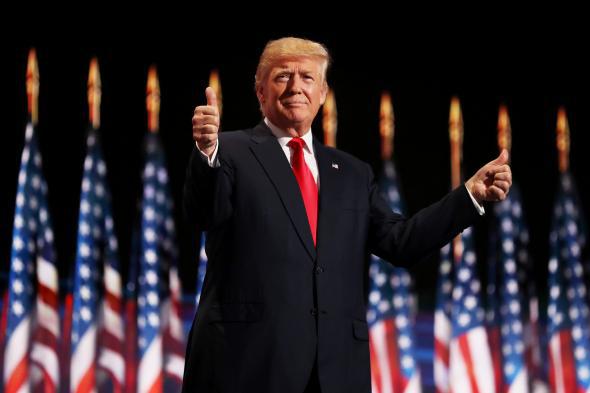As it so often does with Donald Trump, it began with a tweet:
This, as has been widely noted, is nonsensical. The Commission on Presidential Debates consulted with both parties before setting the fall schedule for the three presidential debates and the single vice presidential one. Furthermore, the bipartisan panel announced the dates in September of last year, more than four months before this year’s first nominating contest and nearly seven months before the NFL released its schedule for the upcoming season. Scheduling conflicts between major sporting events and the general election debates are also neither new—there were two NFL conflicts in 2012 alone—nor easily avoidable, given the NFL now plays on Sundays, Mondays, and Thursdays, while MLB playoff games up to and including the World Series can fall on any day of the week. (Added bonus: Trump claims the NFL sent him a letter alerting him about the conflict; the NFL says that didn’t happen.)
None of that seems to matter to Trump and his team, though. They spent the weekend demanding that the first two presidential debates—on Monday, Sept. 26, and on Sunday, Oct. 9—be rescheduled, while also continuing to push their chosen narrative that this is all one big conspiracy to put Hillary in the White House. “Hillary Clinton wants to be against the NFL,” Trump claimed during an ABC News interview. His campaign manager, Paul Manafort, went even further. “Just like we discovered in the hack of the DNC, Mrs. Clinton likes low audiences watching her debates,” he told CBS News. “That’s what she conspired for to keep Bernie Sanders from getting a large audience. Mr. Trump said: I want to debate. I will do three debates. But I want it to be the maximum audience.”
The debate commission is, so far, holding its ground. “It is impossible to avoid all sporting events, and there have been nights on which debates and games occurred in most election cycles,” it said in a statement on Sunday. “A debate has never been rescheduled as a result.” Still, the Trump camp—now with the full backing of the Republican National Committee—is suggesting that it isn’t done dealing just yet. “We would like the debates to not be head-to-head against major NFL games,” Trump adviser Jason Miller told CNN. “That’s something we’ll be discussing as we go into negotiations.”
It’s impossible to know whether Trump’s real goal here is to change the dates of the debates, or to get out of them entirely. Could Trump sit out one or more of the debates? Yes, he could. Trump’s proved time and again that he is not bound by the norms or traditions of American politics. He skipped a GOP debate in the days before the Iowa Caucus; there’s no reason he couldn’t do the same in the lead-up to Election Day.
By complaining about the schedule now, Trump is risking little more than looking petulant—an image he happily embraces, and a small price to pay for the possible rewards. What are those rewards? In the near term, by going on record that the debate system is “rigged” against him, Trump is hoping to squeeze the last remaining juice out of the DNC hack story. In the midterm, meanwhile, if the commission does ultimately relent and meet his demands, he’ll have won himself another ratings-themed talking point to shout about from the stump. And more important than any of that is the long term: Trump has now laid a foundation to skip the debates entirely if he wants to this fall—or, more likely, to complain if and when they don’t go as well for him as he’d like.
